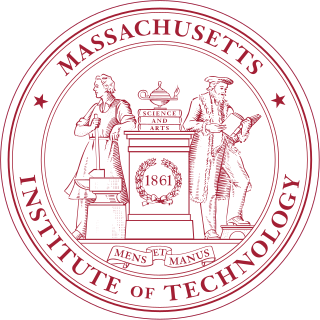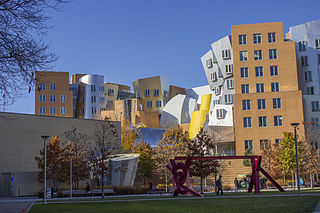Related Research Articles

The Massachusetts Institute of Technology (MIT) is a private land-grant research university in Cambridge, Massachusetts. Established in 1861, MIT has played a significant role in the development of many areas of modern technology and science.

Stata Center, officially the Ray and Maria Stata Center and sometimes referred to as Building 32, is a 430,000-square-foot (40,000 m2) academic complex designed by architect Frank Gehry for the Massachusetts Institute of Technology (MIT). The building opened for initial occupancy on March 16, 2004. It is located on the site of MIT's former Building 20, which had housed the historic MIT Radiation Laboratory, at 32 Vassar Street in Cambridge, Massachusetts.

William Barton Rogers was an American geologist, physicist, and educator at the College of William & Mary from 1828 to 1835 and at the University of Virginia from 1835 to 1853. In 1861, Rogers founded the Massachusetts Institute of Technology. The university opened in 1865 after the American Civil War. Because of his affiliation with Virginia, Mount Rogers, the highest peak in the state, is named after him.

Joichi "Joi" Ito is a Japanese entrepreneur and venture capitalist. He is the President of Chiba Institute of Technology. He is a former director of the MIT Media Lab, former professor of the practice of media arts and sciences at MIT, and a former visiting professor of practice at Harvard Law School. Ito has received recognition for his role as an entrepreneur focused on Internet and technology companies and has founded, among other companies, PSINet Japan, Digital Garage, and Infoseek Japan. Ito is general partner of Neoteny Labs, and former board member of Creative Commons, The Electronic Privacy Information Center (EPIC), The Internet Corporation for Assigned Names and Numbers (ICANN), John S. and James L. Knight Foundation, The New York Times Company, John D. and Catherine T. MacArthur Foundation, The Mozilla Foundation, The Open Source Initiative, and Sony Corporation. Ito wrote a monthly column in the Ideas section of Wired.

MIT Technology Review is a bimonthly magazine wholly owned by the Massachusetts Institute of Technology. It was founded in 1899 as The Technology Review, and was re-launched without The in its name on April 23, 1998, under then publisher R. Bruce Journey. In September 2005, it was changed, under its then editor-in-chief and publisher, Jason Pontin, to a form resembling the historical magazine.

Deborah Leigh Blum is an American science journalist and the director of the Knight Science Journalism program at the Massachusetts Institute of Technology. She is the author of several books, including The Poisoner's Handbook (2010) and The Poison Squad (2018), and has been a columnist for The New York Times and a blogger, via her blog titled Elemental, for Wired.

Ethan Zuckerman is an American media scholar, blogger, and Internet activist. He was the director of the MIT Center for Civic Media, and Associate Professor of the Practice in Media Arts and Sciences at MIT until May 2020, and the author of the 2013 book Rewire: Digital Cosmopolitans in the Age of Connection, which won the Zócalo Book Prize. In 2020, he became an associate professor of public policy, communication and information at the University of Massachusetts.

Andy Carvin is an American blogger and a former senior product manager for online communities at National Public Radio (NPR). Carvin was the founding editor and former coordinator of the Digital Divide Network. He is a field correspondent for the vlog Rocketboom.

Alan Kotok was an American computer scientist known for his work at Digital Equipment Corporation and at the World Wide Web Consortium (W3C). Steven Levy, in his book Hackers: Heroes of the Computer Revolution, describes Kotok and his classmates at the Massachusetts Institute of Technology (MIT) as the first true hackers.

The Knight Science Journalism program offers 9-month research fellowships, based at its headquarters at the MIT School of Humanities, Arts, and Social Sciences, to elite staff and freelance journalists specializing in coverage of science and technology, medicine, or the environment. Fellows are chosen from an international application pool in a competitive process each spring, and reside in Cambridge, Massachusetts, for two semesters of audited coursework and research at MIT, Harvard, and surrounding institutions.

David M. Halperin is an American theorist in the fields of gender studies, queer theory, critical theory, material culture and visual culture. He is the cofounder of GLQ: A Journal of Lesbian and Gay Studies, and author of several books including Before Pastoral (1983) and One Hundred Years of Homosexuality (1990).
Robert Buderi is an American journalist, author, and editor.

Benjamin Zimmer is an American linguist, lexicographer, and language commentator. He is a contributing editor for The Atlantic. He was formerly a language columnist for The Wall Street Journal, The Boston Globe, and The New York Times Magazine; and editor of American dictionaries at Oxford University Press. Zimmer was also an executive editor of Vocabulary.com and VisualThesaurus.com.
Tony Bartelme, an American journalist and author, is the senior projects reporter for The Post and Courier in Charleston, South Carolina. He has been a finalist for four Pulitzer Prizes.
Judy Malloy is an American poet whose works embrace the intersection of hypernarrative, magic realism, and information art. Beginning with Uncle Roger in 1986, Malloy has composed works in both new media literature and hypertext fiction. She was an early creator of online interactive and collaborative fiction on The WELL and the website ArtsWire.

David Meyer Wessel is an American journalist and writer. He has shared two Pulitzer Prizes for journalism. He is director of the Hutchins Center on Fiscal & Monetary Policy at the Brookings Institution and a contributing correspondent to The Wall Street Journal, where he worked for 30 years. Wessel appears frequently on National Public Radio's Morning Edition.
Walter Carl Clemens, Jr. is an American political scientist known for advancing complexity science as an approach to the study of international relations and for arms control and U.S. relations with communist and post-communist countries.
Raymond Stuart Stata is an American entrepreneur, engineer, and investor.
Undark Magazine is a nonprofit online publication exploring science as a "frequently wondrous, sometimes contentious, and occasionally troubling byproduct of human culture." The name Undark is a deliberate reference to a radium-based luminous paint product called Undark that ultimately proved toxic, if not deadly for those who handled it.
Victor King McElheny is an American science writer and journalist, who has covered a wide variety of topics, including the Apollo lunar landing program, molecular biology, astronomy, science in Antarctica, and environmental issues.
References
- 1 2 Morley, Tarrin (2008-07-04). "Media News". Archived from the original on 2010-07-13. Retrieved 2010-02-05.
- 1 2 "Brian Bergstein" (PDF). Retrieved 10 May 2013.
{{cite journal}}: Cite journal requires|journal=(help)[ permanent dead link ] - ↑ "2004-05 Knight Fellows". Massachusetts Institute of Technology. Retrieved 2007-08-11.
- 1 2 "Brian Bergstein | MIT Technology Review". Technology Review. Retrieved 10 May 2013.
- ↑ Austin, Kyle (2008-06-25). "RaceTalk(s) with Brian Bergstein, National Technology Editor at the Associated Press" . Retrieved 2010-02-05.